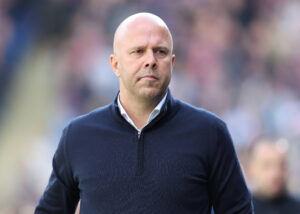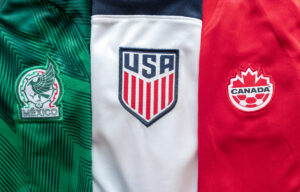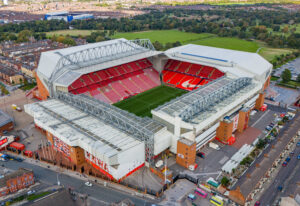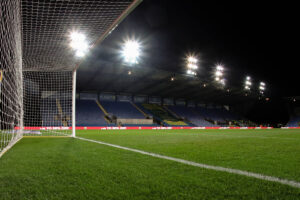It is not difficult to select Arsenal’s greatest ever European triumph, because for all their domestic achievements (13 league titles and a record 13 FA Cup wins) the Gunners have only ever won two European trophies. That is a depressingly low number for one of the undoubted giants of the English game; indeed, it is even exceeded by Tottenham Hotspur’s total of three European trophies, which is the only type of major silverware that Spurs have won more of than their north London neighbours. Of those two European triumphs, one – the 1994 Cup Winners’ Cup victory – effectively signalled the end of a period of glory (the George Graham era), while the other – the 1970 Fairs Cup win – marked the re-emergence of the club, after a long period of decline, as a trophy-winning force. Consequently, it is the 1970 triumph that is undoubtedly the greatest European triumph in the history of Arsenal.
The Managers, Players and Matches That Made Arsenal
Arsenal in 2020 and 1970
There are significant parallels between Arsenal in 2020 and Arsenal in 1970. 2020 marks the 16th successive season in which Arsenal have failed to win a league title, since the Invincibles of 2004, whereas 1970 would mark the 17th successive year in which the club had failed to become champions since the superb 1953 side that had been led by Jimmy Logie, the brilliant Scottish inside-forward (or number ten in 21st-century football parlance).
However, things were even worse for Arsenal at the start of the 1970s than they are now, half a century later, at the start of the 2020s (the Coronavirus-caused cessation of all football globally notwithstanding). In 1970, Arsenal had not won a trophy of any kind for 17 years, since that 1953 league title, whereas even during the long, slow decline of Arsène Wenger’s second decade in charge, the club still won three out of four FA Cups between 2014 and 2017. Worse still, Arsenal’s stagnating 1960s had been in complete contrast with the spectacular 1960s of Spurs, who had begun it by winning the League and FA Cup Double in 1961 (becoming the first English club to achieve what was once thought utterly unachievable), and then punctuated the decade with regular domestic and European cup victories, including the 1963 Cup Winners’ Cup (which made them the first English club to win a European trophy of any kind) and the 1967 FA Cup. With crowds dwindling at Highbury while Tottenham enjoyed a succession of ‘Glory, Glory’ nights at White Hart Lane, particularly in Europe, it seemed by the end of the 1960s that there might just have been a permanent shift in power in north London football.
Enter the Utterly Unselfish Bertie Mee
Enter probably the most unlikely hero in Arsenal’s long and illustrious history, Bertie Mee. Mee is the perfect antidote to the idea of nominative determinism (the theory that your name somehow determines or at least influences the scale of your achievements) because far from being concerned with himself and his own ego he proved to be the ultimate team man.
Mee was appointed as Arsenal manager in 1966, replacing Billy Wright, the great Wolverhampton Wanderers player of the 1950s who had completely failed to translate his enormous achievements on the pitch into any kind of success during his four years in charge of Arsenal from 1962 onwards. It is arguable that Mee’s appointment as Arsenal manager was even more surprising than the supposed shock appointment of Arsène Wenger three decades later, because Wenger had already won the league title in France with Monaco, whereas Mee was only Arsenal’s physiotherapist when he became the club’s manager. Indeed, legend has it that Mee himself was so unconvinced of his own chances of success that he had it written into his contract that he could return to his old job as physiotherapist if he did not succeed as manager. Fortunately for Arsenal, there was no need for him ever to pick up the magic sponge again, as he reigned at Arsenal, the only club he ever managed, for the next decade, achieving considerable success, especially in the first half of his tenure.
Don Howe, Mee’s Right-Hand Man
Mee is a classic example of the old Robert Mitchum dictum that “A man’s gotta know his limitations”. He had been a fairly undistinguished professional player with Derby County and Mansfield Town until injury had ended his career and he then became a physiotherapist in the Army, giving him a background in fitness training and motivation that served him well as Arsenal boss. However, he was also acutely aware of his own lack of tactical expertise, which is why he swiftly appointed not one but two coaches who were young, dynamic and tactically astute: Dave Sexton and Don Howe. When Sexton left Arsenal a year later to manage Chelsea, Howe came into his own as the tactical wizard (especially when it came to organising a defence) alongside Mee the man-manager, in a southern equivalent of the northern pairing of Joe Mercer and Malcolm Allison that had completely transformed Manchester City in the 1960s.
However, unlike several of his successors, including George Graham and Arsène Wenger, Mee did not achieve instant success. In fact, for the first few years under him, it appeared that Arsenal’s long-term decline had become completely irreversible, especially when they lost successive League Cup Finals in 1968 (to the great Leeds United side of Don Revie, a team that it was no shame to lose to) and 1969 (to then Third Division Swindon Town, which it was certainly a shame, and a shock, to lose to). As Tottenham continued to win trophies, and even the previously dormant Chelsea began to emerge under Mee’s former assistant Sexton, there were serious doubts among fans, commentators and writers that Mee would ever make the successful transition from physio to manager.
Charlie George and a Golden Generation of Young Players
There was one thing that sustained both Mee and Arsenal fans during the unsuccessful end to the 1960s, and that was the emergence of a brilliant crop of youth players, the likes of which would not be seen again at Arsenal for another decade and a half and the emergence of ‘The Class of ‘82’, as Martin Keown has famously christened them, of Adams, Rocastle and Thomas. Among those young players were many who would become mainstays of the team, first winning the Fairs Cup in 1970 and then finally matching Spurs by winning the Double in 1971. And at least some of them are still remembered and celebrated by Arsenal fans half a century on, in particular Charlie George, the low-rent London George Best who would go on to score the winner in the 1971 FA Cup Final, before immediately falling to the floor, arms outstretched, in perhaps the most iconic celebration of an FA Cup winner there has ever been.
Back at the start of the 1969/70 season, however, George was just beginning to make his way into the Arsenal first team, alongside the likes of the superb young Irish right-back (and later right-hand man of Arsène Wenger) Pat Rice and the two strikers who would go on to become a twin spearhead as the Gunners finally won some trophies again after nearly 20 years, John Radford and Ray Kennedy. Nevertheless, perhaps because there were so many new young players being tried out together, Arsenal did not exactly excel in the league; indeed, they actually finished 12th, which was below halfway in a First Division of 22 teams. But in Europe, it was a different story entirely.
Arsenal and the Dream of European Glory
When Arsenal had dominated English football 30 years earlier, the man who had first built the club into a title-winning outfit, Herbert Chapman, had dreamt of taking them into European competition against the continent’s other best sides, but even two decades later, when Arsenal were still winning league titles and competing at the top of the English game, Chapman’s dream had still not been realised. Indeed, by the time that continent-wide European club football finally began in the mid-1950s, Arsenal had already begun their long decline, which continued throughout the 1960s, and by the end of the 1960s, the idea that the Gunners could ever conquer Europe appeared almost risible.
Nevertheless, between them, Mee and Howe masterminded Arsenal’s safe navigation through the early rounds of the Fairs Cup (as the UEFA Cup was originally called, in recognition of the major European “fairs” or festivals that had been part of post-war European culture) in 1969/70. And if Arsenal did not exactly face a European giant in the early rounds (beating Glentoran, Sporting Lisbon, Rouen and Dinamo Bacău), there was no denying the quality of the opponents that they faced, and ultimately overcame, in the semi-finals and Final.
The 1970 Semi-Finals
First, in the last four, they played Ajax, who were not yet the mighty Ajax that would dominate European club football in the early 1970s, winning a hat-trick of European Cups between 1971 and 1973, but who were still a hugely accomplished outfit. Less than a year earlier, their young side, featuring future megastar Johan Cruyff, had reached the final of Europe’s premier club competition, the European Cup. And although Ajax had ultimately lost that 1969 final 4-1 to the great AC Milan side of Gianni Rivera, when they were drawn against Arsenal in the semi-finals of the 1970 Fairs Cup it was generally believed that they would have far too much for the Gunners to cope with. Fortunately for Arsenal, their young side completely upset the odds, first by winning the home leg of the semi-final 3-0 and then by only losing 1-0 in Amsterdam, to win the tie 3-1 on aggregate.
The Two-Legged 1970 Final
However, if Arsenal thought that they had done the hard part in beating Ajax, they soon received a rude awakening, as they faced another highly impressive side from the Low Countries, Belgium’s Anderlecht, in the two-legged final. That Anderlecht team, whose star was striker Paul van Himst, one of Belgium’s greatest ever players, would provide the bulk of the national side that reached the 1972 European Championship semi-finals (only losing narrowly to eventual winners West Germany). And in the first leg of the 1970 Fairs Cup final, they served serious notice of their intent to win the competition by defeating Arsenal 3-1 at home, with only a late (82nd-minute) goal from Ray Kennedy offering the Gunners any hope for the second leg in London less than a week later.
What followed, however, was one of the all-time great nights at Highbury, and arguably the greatest night that Arsenal enjoyed at their home ground since the all-conquering days of the 1930s, when, in addition to winning the league five times and the FA Cup twice, an England side featuring seven Arsenal players had beaten the reigning World Champions, Italy, in 1934’s infamous ‘Battle of Highbury’. However, the events of 28 April 1970 were to prove almost as remarkable and historic as that ‘World Cup win’ of the mid-1930s.
Arsenal not only had to overcome a two-goal deficit from the first leg of the final; they also had to try and keep a clean sheet, to prevent Anderlecht scoring a potentially crucial away goal. Consequently, they had to play the perfect “European” game, combining relentless attack with tight defence. And incredibly, indeed almost miraculously, they did so. They scored the vital first goal early on, with Scottish midfielder Eddie Kelly scoring in the 25th minute. They then had to wait for nearly an hour for their second goal, which was scored by John Radford in the 75th minute. Then, astonishingly, they had to wait less than 60 seconds for their third goal as another midfielder, Jon Sammels (who had been a Gunners fan throughout the long trophy drought of the 1950s and 1960s), almost instantly scored again. That crucial third goal gave Arsenal a 4-3 aggregate lead, which they held on to, relatively comfortably, for the rest of the game.
The Legacy of 1970
Arsenal and their fans have been unable to mark the 50th anniversary of the 1970 Fairs Cup triumph because of the current Coronavirus-caused lockdown. Nevertheless, Arsenal fans today should be in no doubt of the historic importance of that European success. In the short – indeed, immediate – term, it created the side and even more importantly the momentum that would take the club to double-winning glory just 12 months later. In the medium term, it restored the Gunners to the top table of English football, and although that Arsenal side did not win another trophy after the 1971 double (indeed, Arsenal as a club would only win one more trophy, the 1979 FA Cup, in the next 16 years), the successes of the early 1970s at least restored the Gunners’ traditional dominance over their supposed local rivals, Spurs. And in the long term, the 1970 triumph created a whole new generation of Arsenal fans, including the great (if unofficial) Arsenal historian Nick Hornsby, who fell in love with the club again after nearly two decades of sustained failure. That is why the 1970 Fairs Cup win is unquestionably the greatest European victory in Arsenal’s history and why – Coronavirus lockdown or not – it should still be remembered and celebrated now, more than half a century later.
Main Photo






